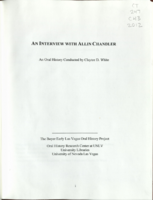Search the Special Collections and Archives Portal
Search Results

Transcript of interview with Walter John Ritzau by Elizabeth Garrison, February 25, 1977
Date
Archival Collection
Description
On February 25, 1977, Walter John Ritzau interviewed Elizabeth Schneehagen Garrison (born 1943 in Las Vegas, Nevada) about her life in Southern Nevada. Garrison first talks about her schooling in Las Vegas and her first homes in Las Vegas. She also discusses the atomic testing, the Devils Hole in Ash Meadows, early church involvement, recreational activities, and some of the environmental aspects of Las Vegas. Garrison later describes her work for the Central Telephone Company before describing the Helldorado parade and some of the early activities designed for children. In the latter part of the interview, she describes her father’s garden, the changes in the city environment and building, shopping locations, and more about her home life.
Text

Transcript of interview with Janet Garry by Elyse Rozinsky, February 24, 1979
Date
Archival Collection
Description
On February 24, 1979, collector Elyse Rozinsky interviewed file clerk, Janet Garry, (born on November 24th, 1927, in Louisiana) at her home in Bonanza Village Trailer Park in Las Vegas, Nevada. This interview covers the growth of Las Vegas from 1952 to 1979. Janet recalls the early years of the television and the telephone. She also discusses her own personal experience of raising a family in Las Vegas.
Text

Transcript of interview with Judith L. Hamblin by Margaret Stambro, March 30, 1976
Date
Archival Collection
Description
On March 30, 1976, collector Margaret Stambro interviewed schoolteacher and registered medical stenographer, Judith L. Hamblin (born June 11, 1941 in Las Vegas, Nevada) in her home in Henderson, Nevada. This interview covers the history of Henderson, local schools and teachers, and Helldorado. Also during this interview, Mrs. Hamblin discusses her fondness for Lake Mead, the Basic Magnesium Plant, Nellis Air Force Base, and the early aboveground atomic blasts.
Text

Transcript of interview with Ruth Hazard by John Neal, March 8, 1975
Date
Archival Collection
Description
On March 8, 1975, John Neal interviews Ruth Hazard (birthdate unknown, 67 years old) in her home about her memory of how Southern Nevada has changed economically. Hazard goes in-depth about her knowledge of municipal politics and her husband’s friendships with a number of Nevadan politicians. Hazard also briefly talks about her fascination with the above-ground atomic tests, speakeasies during Prohibition, and local anxieties about Las Vegas “losing its identity.”
Text

Transcript of interview with Lomie Heard by Stephen Singer, February 9, 1980
Date
Archival Collection
Description
On February 9, 1980, collector Stephen M. Singer interviewed schoolteacher, Lomie Heard (born January 22nd, 1906 in Carlsbad, New Mexico) in her home in Las Vegas, Nevada. This interview covers education over the span of thirty years, and includes an overview on the building of the University of Nevada Las Vegas. Also discussed during this interview: Nellis Air Force Base, jet airplanes at Nellis, military families, and the Nevada Test Site.
Text

Transcript of interview with Emma Ellsworth by Clark Ellsworth, March 5, 1980
Date
Archival Collection
Description
On March 5, 1980, Clark Ellsworth interviewed his grandmother, Emma Ellsworth (born 1902 in Payson, Utah) about her experiences in Southern Nevada. Ellsworth first talks about growing up in Utah and getting married before moving to Pioche, Nevada during the Great Depression. She also talks about bringing up a family in Las Vegas as well as her and her husband’s work in running Beneficial Life, a life insurance business, in Las Vegas. Ellsworth also talks about the Mormon churches in Las Vegas, the schools her children attended, and the number of grandchildren and great-grandchildren she had at the time.
Text

Transcript of interview with Murl Emery by James M. Greene, October 18, 1974
Date
Archival Collection
Description
On October 18, 1974, James M. Greene interviewed Murl Emery (born June 7th, 1903 in Bolton, California) at his home in Nelson, Nevada. Also present during the interview is Mrs. Emery and Mr. Dutch Eckhart, a guest who has just arrived to visit with Mr. Emery. The interview covers Mr. Emery’s personal experience in and around Southern Nevada, particularly in the areas from Searchlight, Nevada to Nelson, to Boulder Canyon, but mostly on the Colorado River. Mr. Eckhart also helps to interject some insight into the popularity of the Model T Ford in those days and early days of newly paved roads. Additionally, they discuss water shortage, wells, the building of the railroad, and mining in Nevada. Mr. Emery also discusses the books that were written about his adventurous life, his discoveries and his explorations.
Text

Transcript of interview with Stella Fleming by Suzanne Wright, February 24, 1979
Date
Archival Collection
Description
On February 24, 1979, Suzanne Wright interviewed Stella Fleming (born December 1, 1897 in Victoria, Canada) about her experiences as a Las Vegas, Nevada resident and as a worker in the welfare department in Clark County. Fleming first talks about some of her work in welfare and specifically the early practices of the welfare administration. She also discusses her work as it related to the Works Progress Administration, the American Red Cross, and the Nevada Emergency Relief Program. Fleming also provided some anecdotes about her experiences in that field before moving on to discuss some of the historical aspects of Las Vegas, such as the atomic testing, specific landmarks and locations, and the development of the city.
Text

Transcript of interview with Dorothy Ross Fletcher by Sharon Hildebrandt, June 26, 1975
Date
Archival Collection
Description
On June 26, 1975, Sharon Hildebrandt interviewed Dorothy Ross Fletcher (born 1936 in Las Vegas, Nevada) about growing up in and living in Southern Nevada. Fletcher first talks about that various towns in which she lived while growing up before discussing the schools she attended. She also discusses the changes in schools, her involvement in politics, church activity, gambling as a recreational activity, and prominent visitors who came to Las Vegas. Fletcher also talks about living in Nevada during World War II, the atomic testing, environmental changes and extreme weather, and the social changes in Las Vegas. The latter part of the interview involves discussion of real estate, the introduction of air conditioning for cooling, changes on the Las Vegas Strip, recreational activities available to youth in Las Vegas and the increase in the nonnative population.
Text

Transcript of interview with Allin Chandler by Claytee White, February 5, 2013
Date
Archival Collection
Description
Another member of Rancho High School's first graduating class of 1962, Allin Chandler charted a course that took him from school football to a distinguished career as a teacher, principal, and Executive Director for the Clark County Association of School Administrators. Allin moved to Las Vegas from Texarkana, Texas with his mother in 1958, joining his father who was serving in the Air Force and stationed at Nellis AFB. Starting 9th grade at J.D. Smith Junior High and continuing on to Rancho the following year. Still actively involved in school athletics, Allin quickly discovered his talent and love for maths and science and eventually earned his degree in math and education. The stories Allin shares in this interview paint a vivid picture of how an intelligent and motivated young man can succeed - and how the class-free world of Las Vegas in the 1950s and 60s offered opportunities that he would never have had in class-conscious world of the South.
Text
